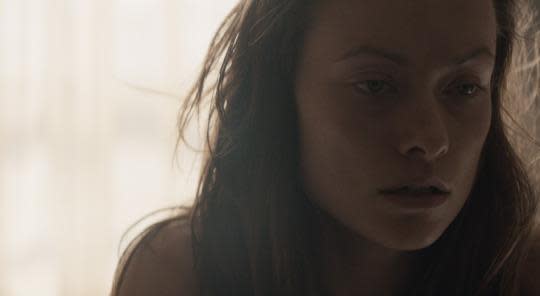How Pregnancy and a Cancer Battle Helped Shape Olivia Wilde's New Drama

Olivia Wilde in ‘Meadowland’ (Tribeca Film Festival)
Shortly after joining the cast of Meadowland, which premiered on Friday night at the Tribeca Film Festival, Olivia Wilde received two major pieces of news: She was pregnant, and writer-director Reed Morano had cancer.
It was mid-2013 when Wilde signed up for the drama, in which she plays a mother grieving over the disappearance of her young son. The pregnancy news came first, and instead of looking for another actress, as often happens in a business that requires a filmmaker to strike when the iron is hot, Morano stuck with Wilde as her star. Wilde returned the loyalty six months later when the director was diagnosed with Stage II squamous cell carcinoma, a cancer of the skin, in December of 2013, right smack in the middle of the pre-production period that can make or break a film.
“During my treatment I couldn’t speak for more than six weeks,” Morano told Yahoo Movies. “There was a time period when we were trying to set meetings with actors, and I was like, ‘Guys I can’t really talk.’ A lot goes on in your head when you’re not talking all day and you’re just lying in your bed and you’re overdosing on the Criterion Collection and costume dramas on Netflix.”
Morano admits that she “was in a very dark place” during chemotherapy and radiation treatment, but was buoyed by the work that Wilde and fellow producer Matt Tauber (Autumn Blood) were doing on her behalf. “I was lucky to have the iron in the fire in Meadowland,” she said. “These guys were still going full force.”
“We operated as if she wasn’t sick, and that was because of the energy she was putting out,” Wilde remembered. “Matt and I were both in L.A. and so a lot of our meetings were on the phone, and that had something to do with it. We never saw her sick.”
Morano pushed through the illness in time for an August production start, and ultimately, it helped inform her filmmaking. The brush with her own mortality and the drudgery of trying to get through a day whilst dealing with extreme pain gave a window of sorts what her characters — Luke Wilson plays Phil, Sarah’s grieving husband — had to try to overcome just to get out of the house.
For Wilde, the experience of becoming a mother (she has a 1-year-old son with her partner, Jason Sudeikis) was also crucial to better understanding how to play an absolutely broken mother.
“Without being a mother, I would have had to do a lot more work to try to understand what [losing a child] would feel like,” she said. “I credit Otis for giving me perspective on what the depths of that emptiness and pain feel like.”
In the film, Wilde’s character, Sarah, is still a wreck a year after her seven-year-old son Adam goes missing in a gas station bathroom. She takes lithium for her depression, and going off the pills only makes things worse; once the medication gets flushed down the drain, Sarah begins failing at her job and then just functioning as an adult. Wilde was driven not only by her own maternal instincts, but also the close relationship she forged with Morano, a mother of two who cast her own son as the kidnapped boy.
“It’s not to say that actresses who don’t have kids can’t play mothers — men can play mothers — but I think for this story it took us to a deeper level to be able to connect as mothers telling this story together,” Wilde said. “I really think it would have been very isolating and depressing to go through all those emotions alone. But Reed was going through it with me. I wasn’t just imagining the loss of my own son — we were imagining the loss of our sons together. And that is what made it bearable. It was like when you’re in a scary house, and you’re like, ‘Will you come with me to that dark scary hallway?’ It was only bearable because she was holding my hand.”
After the premiere of the film, Wilde said she “couldn’t stop shaking, it took until 2 a.m. to come down.” Seeing a performance that raw on the big screen while sitting amid a sold-out crowd (that included her parents) was remarkably difficult — especially because, for all the help having her own son provided in understanding Sarah, being a producer allowed her to push herself to ugly extremes that she might normally try to avoid. Prime among them: A brutish sex scene with co-star Kevin Corrigan.
“I knew we needed a shot to show how non-sexual and violent this sex was, so we’ve got to have a shot that shows my body,” she added. “Whereas, if I was just the actress, maybe I would say, ‘Do we need that?’ But I as a partner of the storyteller, I thought, absolutely.”
The end result is one of the most raw performances of Wilde’s career, and a well-received directorial debut for Morano. It’s a good thing they stuck with it.

